The room went dead quiet. She started crying and stormed off. All I said was, “Back in your day, women also stayed quiet while being disrespected.
I’m not built that way.”
My husband looked stunned. His sister dropped her fork. His father cleared his throat like he was about to say something, then didn’t.
I stood there for a moment, unsure if I should sit or leave. I sat. My hands were shaking, but I tried to act like everything was fine.
Truth be told, I wasn’t trying to start drama. I just couldn’t keep swallowing her passive-aggressive digs anymore. Dinner went on in awkward silence.
The candles flickered. Someone tried to restart a conversation about vacation plans, but it didn’t go far. My husband leaned in and whispered, “Maybe you should go talk to her.”
I sighed.
“Why me? She came for me.”
He gave me that look. The Please do it for me look.
So I got up and walked to the guest room. She was sitting on the edge of the bed, dabbing her eyes with a tissue. The moment I stepped in, she looked up, visibly upset.
“You embarrassed me,” she said quietly. “I didn’t mean to,” I replied. “But you keep making comments about how I dress.
Every time.”
She looked down, then said something I didn’t expect. “You remind me of myself when I was young. And I hate it.”
That caught me off guard.
“What do you mean?”
She hesitated. “I used to wear short skirts. Bright lipstick.
Heels that clacked when I walked into church. My mom hated it. My husband hated it too.
Said I looked like I was ‘asking for attention.’ So I stopped. I shrank. I became the woman they wanted me to be.
And now when I see you, confident and unapologetic, I get angry. But not at you. At myself.”
I didn’t know what to say at first.
I sat beside her. “I’m sorry if I hurt you,” I said gently. “But I’m not trying to prove anything with the way I dress.
It just makes me feel… me.”
She gave a small nod, staring at the wall. “I guess I still have things I need to work on.”
I placed my hand on hers. “We all do.”
We sat like that for a moment, quiet.
The clatter of plates from the dining room floated down the hallway. For the first time since I married her son, I felt like we were two women talking—not daughter-in-law and mother-in-law, but equals. We eventually rejoined the table.
She didn’t say much, but she gave me a small smile when I passed the salad bowl. It felt like the air had shifted. A few weeks passed.
Then something unexpected happened. She called me. “Can we go shopping?” she asked.
I blinked. “Shopping?”
“Yeah. I want you to help me pick out something new.
Something a little… different.”
I smiled. “Of course.”
That Saturday, we walked through stores she never used to set foot in. She tried on a flowy green dress and turned slowly in the mirror.
“No,” I said. “It’s just right.”
She looked like she wanted to cry again, but this time, it was different. “I forgot what it felt like to like how I look.”
We got coffee after.
Talked about her childhood, her dreams, the piano lessons she quit when she got married. I saw a side of her I’d never known. And it made me realize something: people don’t become cold overnight.
They’re frozen slowly, over years, by comments, disappointments, expectations. And sometimes, all it takes is a bit of warmth to start thawing them out. But the story doesn’t end there.
About a month later, we were invited to her church for a special event. She had signed up to play piano again—for the first time in thirty years. She wore the green dress.
When she sat down at the piano, hands trembling a bit, the room hushed. Then the music started. It wasn’t perfect—she missed a few notes—but it was beautiful.
Raw. Real. When she finished, the applause was gentle but sincere.
She stood, looked out at the crowd, and said, “I almost didn’t come tonight. I almost let my own shame stop me. But I have a daughter-in-law who reminded me that we’re allowed to take up space.
So I’m here.”
Everyone clapped louder. I felt tears sting my eyes. Later that night, she came up to me and said, “Thank you for not backing down that day.
I needed it.”
Sometimes, standing your ground doesn’t burn bridges—it lights torches for people to find their way back to themselves. But there was still a twist to come. One I didn’t see coming.
One afternoon, I got a text from her. “Lunch today? Need to tell you something.”
We met at a cozy little café near her place.
She looked nervous, fingers twisting the napkin in her lap. “I did something last week,” she said, eyes darting toward mine. “I visited my old house.
The one I grew up in.”
“Oh?”
“I met the new owners. A lovely young couple. I told them I used to live there, and they let me walk through the garden.
Everything looked smaller than I remembered. But being there, I realized something. I’ve spent so many years angry—at my mother, at myself, even at you—because I gave up things I loved.
But it was my choice. And I’ve been punishing others for it.”
She paused. “So I wrote a letter.
To my mom. She’s been gone fifteen years now. But I wrote everything I never got to say.
I buried it under the rose bush in the garden.”
My eyes welled up. “That’s beautiful.”
She nodded, voice cracking. “It felt like closure.
And freedom.”
After that day, something shifted in her permanently. She started volunteering at a women’s shelter, helping young women rebuild their confidence. She began baking again.
Playing piano on Sundays. Wearing colors she once thought were “too loud.”
But perhaps the most surprising twist? She started a blog.
At first, I laughed when she told me. “You? A blog?”
“Yes,” she said, grinning.
“It’s called Back In My Day… I Was Lost. And now I’m not.”
She wrote about marriage, aging, letting go, starting over. Her posts were raw, heartfelt, sometimes messy—but they struck a chord.
Within months, she had thousands of readers. Women her age wrote in droves, thanking her for putting words to what they’d felt for decades. She even got invited to speak at a women’s conference.
She wore the green dress again. Standing behind the podium, she looked radiant. She spoke about how bitterness can be armor, but also a cage.
How loving others sometimes starts with learning to love the parts of yourself you’ve buried. “I used to criticize women for being confident,” she said to the crowd. “But it wasn’t because I disapproved.
It was because I forgot how to be one.”
And the biggest shock of all? She ended her talk by calling me on stage. “I want you to meet the woman who gave me the nudge I needed,” she said.
“She stood up to me, and instead of holding it against her, I held on.”
I walked up, stunned, trying not to cry. We hugged in front of hundreds of women, and I swear, I felt years of tension dissolve. After that, our relationship became something I never thought it could be.
Not perfect. But real. We still had our differences.
I still wore crop tops; she still raised an eyebrow once in a while. But we’d laugh about it now. One evening, while washing dishes side by side after a family barbecue, she looked over and said, “You know, I used to dread your visits.”
I chuckled.
“Yeah, I could tell.”
She smiled. “Now I look forward to them. You’ve helped me live again.”
And I realized something.
Sometimes, when people attack your light, it’s because they’ve forgotten their own. But if you’re brave enough to keep shining—and kind enough to let them step into your warmth—you just might help them remember. So here’s the takeaway:
Stand your ground.
Speak up. But lead with love when you can. Because behind every cold comment is a story.
And sometimes, if you’re lucky, you get to help rewrite it. If this story touched you even a little, share it with someone who needs a reminder that it’s never too late to rediscover yourself. And hey—give it a like if you believe people can change.

